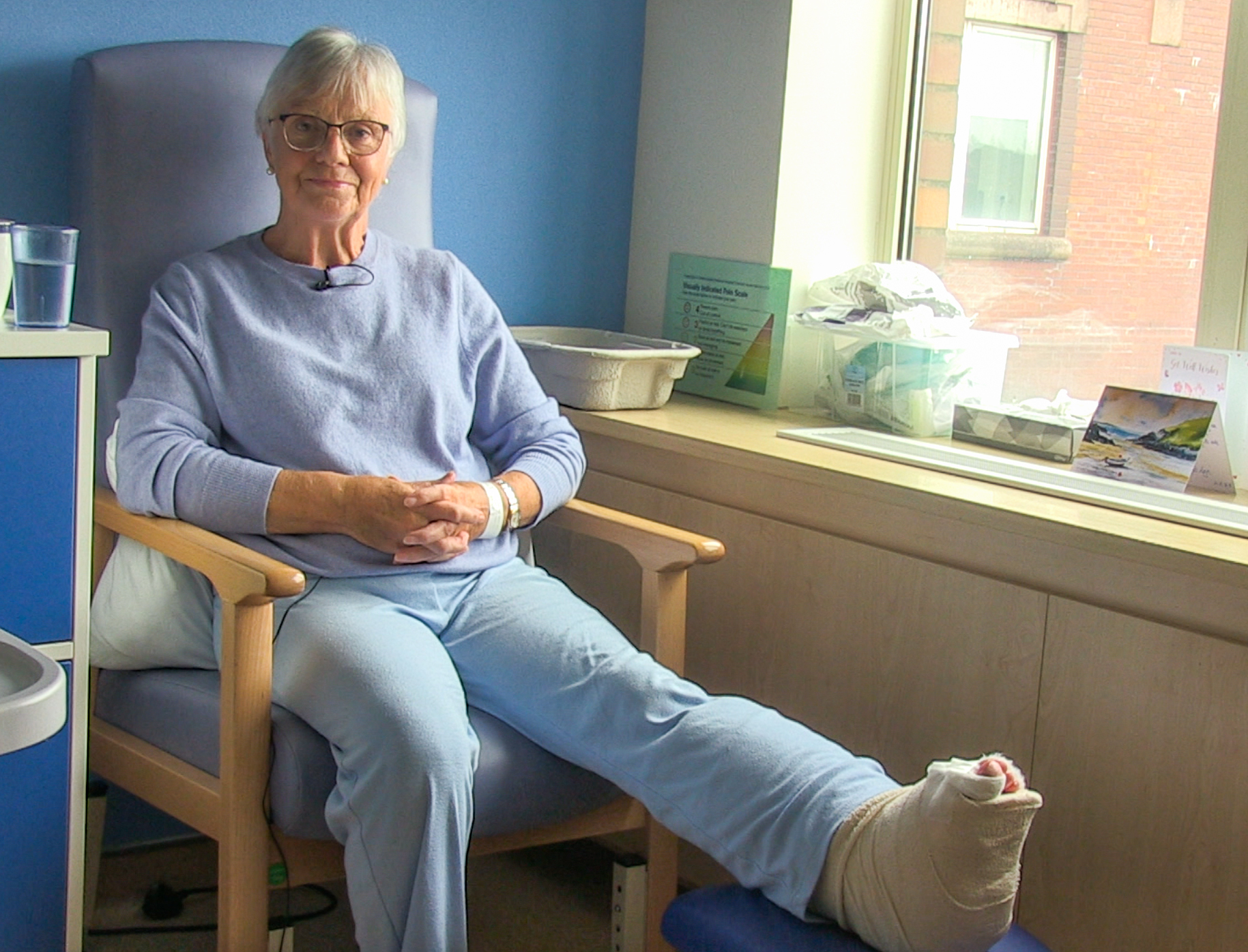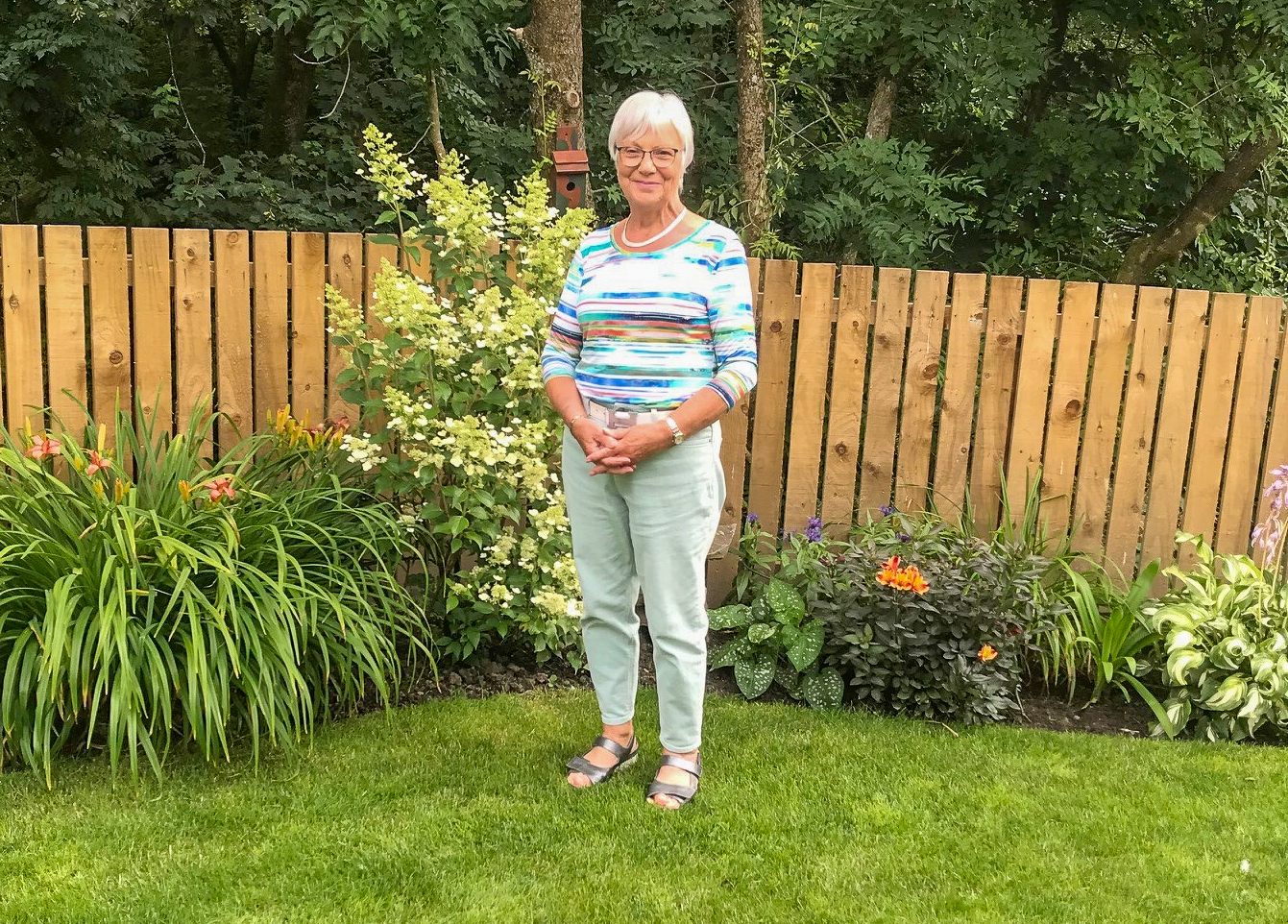
Patient Jan Ritson following her extraordinary procedure in 2020
An extraordinary operation carried out at NHS Golden Jubilee during the COVID-19 pandemic to save a cancer sufferer’s leg has been a resounding success.
Almost 2 years after patient Jan Ritson’s shin bone was removed, sent to another hospital for radiation treatment and then re-inserted back into her leg during a 12-hour procedure, keen golfer Jan is getting back into the swing of normal life after her recovery period.
The rare and complicated operation in August 2020 at the height of the pandemic consisted of removing Jan’s tibia from her left leg at the Golden Jubilee University National Hospital in Clydebank and taken on a 20-minute journey to Glasgow’s Beatson West of Scotland Cancer Centre in a sterile container.
At the Beatson, the bone received radiotherapy and was then re-packaged and brought back to the Golden Jubilee, where the skilled team was waiting to insert it back in place, all while Jan was asleep on the operating table.
The procedure would normally have been performed at Glasgow Royal Infirmary, but in April 2020 the sarcoma service was transferred to the Golden Jubilee to ensure patients continued to receive essential cancer care throughout the COVID-19 pandemic.
The surgical teams, led by Consultant Orthopaedic Surgeon Ashish Mahendra of Glasgow Royal Infirmary, and teams from NHS Golden Jubilee and NHS Greater Glasgow & Clyde, carried out the gruelling 12-hour procedure with the aim of saving her leg and avoiding amputation.
An aim, which according to Jan, has worked remarkably well for her.
Jan said: “I feel everything has gone according to plan. They did say that it was going to be 2 years before everything was healed and I'd be walking properly again.
“I still have some pain in my ankle, which may not be as a result of the operation, but could possibly be age related. I’ve recently had an MRI scan which should indicate if there are any concerns.
“However, I’m back playing golf every week, walking much better and I’m absolutely delighted with the outcome of this.
“I can't praise Mr Mahendra and the teams at the Golden Jubilee highly enough. Mr Mahendra even came in on a day off, just to make sure I was OK and I didn't have any issues, which I think is just amazing.
“Everything went extremely well. The teams were amazing and the care I received was second to none. I'm absolutely delighted with the whole process, and the staff were really superb in every respect.
“I feel that I'm a very, very lucky person and extremely lucky to still have my leg.”

Jan back on her feet following her recovery
Symptoms of bone cancer include:
· Persistent bone pain that gets worse over time and continues into the night
· Swelling and redness (inflammation) over a bone, which can make movement difficult if the affected bone is near a joint
· A noticeable lump over a bone
· A weak bone that breaks (fractures) more easily than normal
· Problems moving around, walking with a limp
Jan is also encouraging anyone who may have symptoms of bone cancer to seek help immediately.
She said: “The earlier cancer is diagnosed the better chance you have of survival so you must go and get and checked out for an early diagnosis if you’re worried about your symptoms.”
Jan’s 12-hour surgery involved a team of three specialist consultant surgeons (Surgical Oncology Consultant, Plastic Surgeon and Foot and Ankle Specialist), two Consultant Anaesthetists, Radiation Oncology Consultant, Theatre teams, Sarcoma Specialist Nurses, Sterilisation Services staff, the National Blood Transfusion Service and medical device company representatives.
Mr Mahendra is delighted with the progress Jan has made and pointed out the dangers the cancerous tumour posed to her leg and life.
Mr Mahendra said: “For the kind of tumour that Jan had there are two main things that we look at - the most important is from the cancer point of view and the second is the leg function after reconstruction.
“The other thing that we have to closely monitor is the disease showing up at any other place because it was a high grade tumour that Jan was diagnosed with.
“The chances are higher in the first couple of years and after that they are strongly in favour of the patient, but it has all gone to plan so far.
“The collaboration was immense, and everyone involved from the Jubilee, the Beatson and the Royal Infirmary put in a massive effort to make sure that the surgery was as straightforward as possible.”
NHS Golden Jubilee Chief Executive, Jann Gardner, said: “At the time this procedure was done it was a very difficult period during the pandemic and we had to adapt to working in new ways to ensure patients got the urgent treatment they required.
“This involved collaborating across health board boundaries and I think Jan’s case is a shining example of how working together with colleagues across NHSScotland, in this case NHS Greater Glasgow and Clyde, can deliver amazing results for the people of Scotland. This is especially important in helping diagnose and treat urgent cases and those who are currently on a waiting list, which is the absolute focus for every health board across the country.
“We are so pleased it has gone so well for Jan and this is down to the exceptional skill of all the teams involved in this extraordinary procedure.”
- Previous story (October 2020): https://www.nhsgoldenjubilee.co.uk/news/press-releases/pree-releases-2020/rare-operation-saves-cancer-patients-leg-amputation
- Sarcoma Awareness Month runs for the duration of July each year.
News Archive
Please browse through our Academy, CfSD and Hotel Press releases.


